
Surah An-Naziat is a Meccan Surah with forty-six verses. An-Naziat means Those Who Tear Out. It is derived from the word Wan-naziat with which the Surah opens.
According to Hazrat Abdullah bin Abbas, this Surah was sent down after Surah An-Naba. Its subject matter also testifies that it belongs to the earliest period at Makkah.
Its theme is affirmation of Resurrection and the life of Hereafter. It also warns of the consequences of belying the Messenger of Allah. It can overall be divided into six parts,
1. It emphasizes on the certainty of the Day of Resurrection and lays stress on its occurrence by emphatic statements, which relate to the Resurrection.
2. It points to one part of the frightening and dreadful incidents of the Final Day.
3. It precisely mentions the story of Moosa a.s and the end of the arrogant Pharaoh as a consolation for both the Prophet pbuh and the believers, as well as giving a warning to the disbelievers, and also contains an indication to the fact that the denial of the Resurrection is the source of many sins.
4. It mentions a few of the countless Powers of Allah, which exist in the heavens and on the Earth; themselves, being evidences of the possibility of Resurrection and the new life after death.
5. It describes another part of the horrible events, on that Great Day, and the painful end of the disbelievers in contrast to the rewards of the righteous.
6. At the end of the Surah, it emphasizes on the fact that no one knows the date of that Day, however, it is certain that it is near.
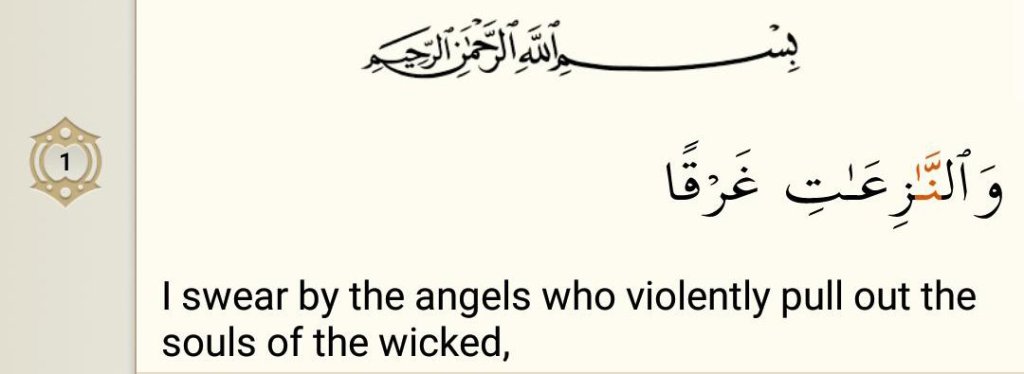
The Surah starts with five oaths. To whom or to what do these five oaths refer? The oaths, at first sight, seem rather ambiguous, while at the same time this ambiguity stimulates us to mediate more deeply and thus causes our progressive thinking. There are several opinions to what these oaths could refer to, such as winds, stars, angels. Allah has kept the scope open for us to think and it is one of wisdoms of Allah. However majority of commentators have taken the oaths to be talking about angels. So we will talk here in accordance to that.
Allah swears in the first oath, By those (angels) who pull out (the souls of the disbelievers and wicked) with great violence having dived in.
An-Naziat comes from the word naza‘a which means to yank out with great force. Here, Allah swears by the ones who yank out. Gharrqa means having dove in. The word Gharqan is used to emphasize the act of pulling out. The verse describes creatures that Allah swears by and that dive deep in and pull out whatever is inside. The oaths are aimed at ‘angels’ who are ordered to tear out the souls of the wicked and the pagan violently, those souls who have never assumed to submit to the Truth.
With regards to disbelievers and hypocrites, the angels of wrath take their souls, coming with harshness and warnings, and the gates of heaven are closed in their faces, so they are thrown in the earth to face woe and punishments as recompense for what they did in this world of wrongdoing, disbelief and enmity. It was also narrated from Ibn Abbas that an-naziat refers to the souls of the disbelievers, which are taken out, then plunged into the Fire.
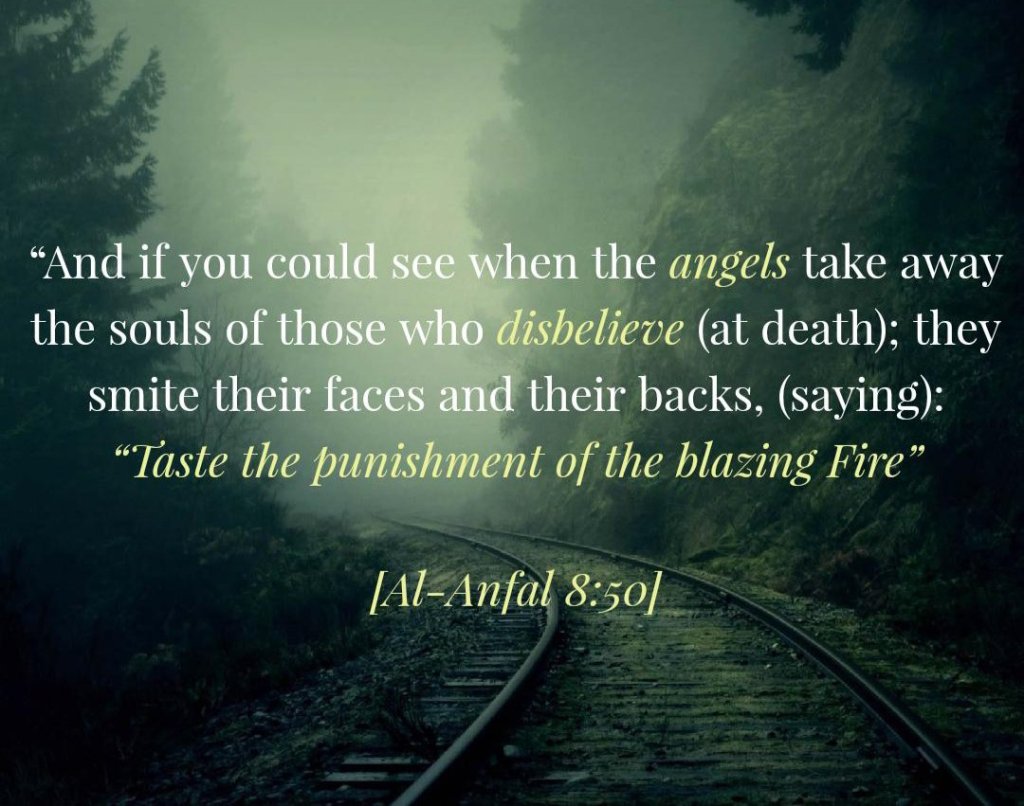

The term nashitat is derived from nasht which originally means ‘to untie the knots which are easily unfastened’. ‘A shallow well’, from which the bucket can be drawn easily at one pull, is called inshaat. ‘A camel which is instigated by a subtle hint and moves very fast’ is called nashitah. Therefore, this word is generally used in any case where a movement is fluently done.
If we take the oath to be talking about angels, then it means By those angels who gently take out the souls of the believers. Where previously the angels pluck the souls of disbelievers so harshly and violently, here in contrast the believers case is the opposite. A believer lives his life in obedience to Allah, knowing one day he has to die and present himself before the Lord, so it’s like when these angles come to take the soul, the soul readily submits in.
The angels of mercy take their souls and lift them up to heaven with great care, coming with glad tidings, calling them by the most loved of their names, so they feel joy, blessing and happiness which makes them steadfast.
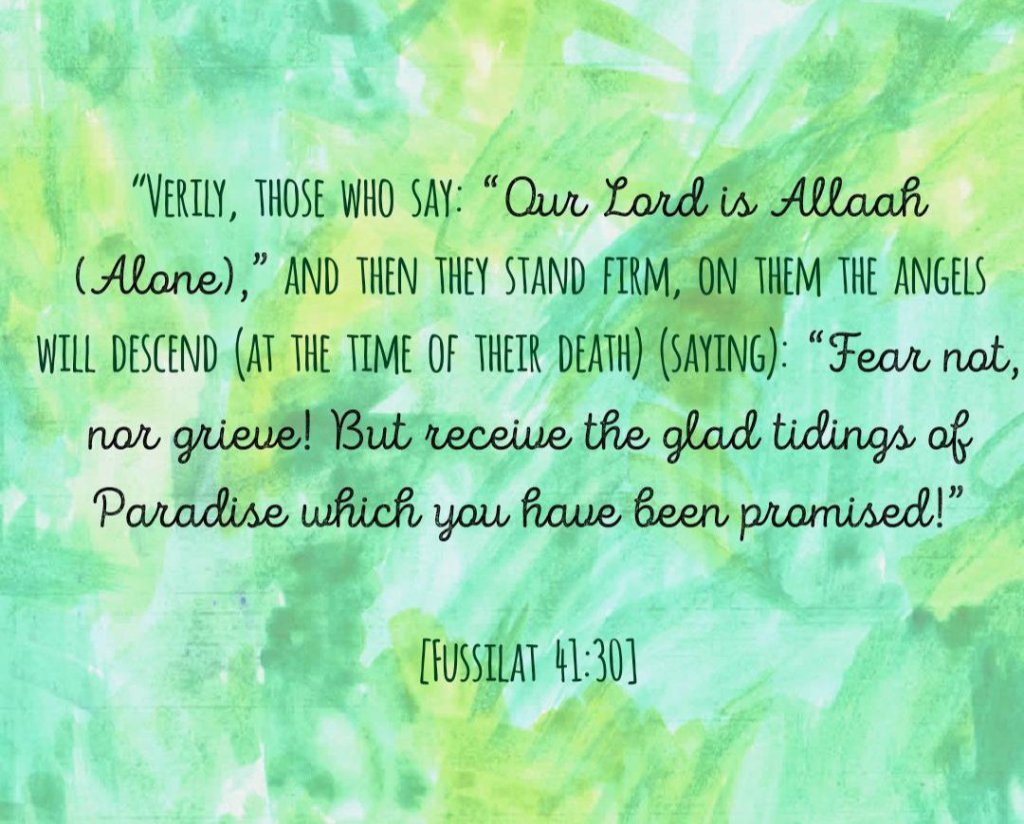
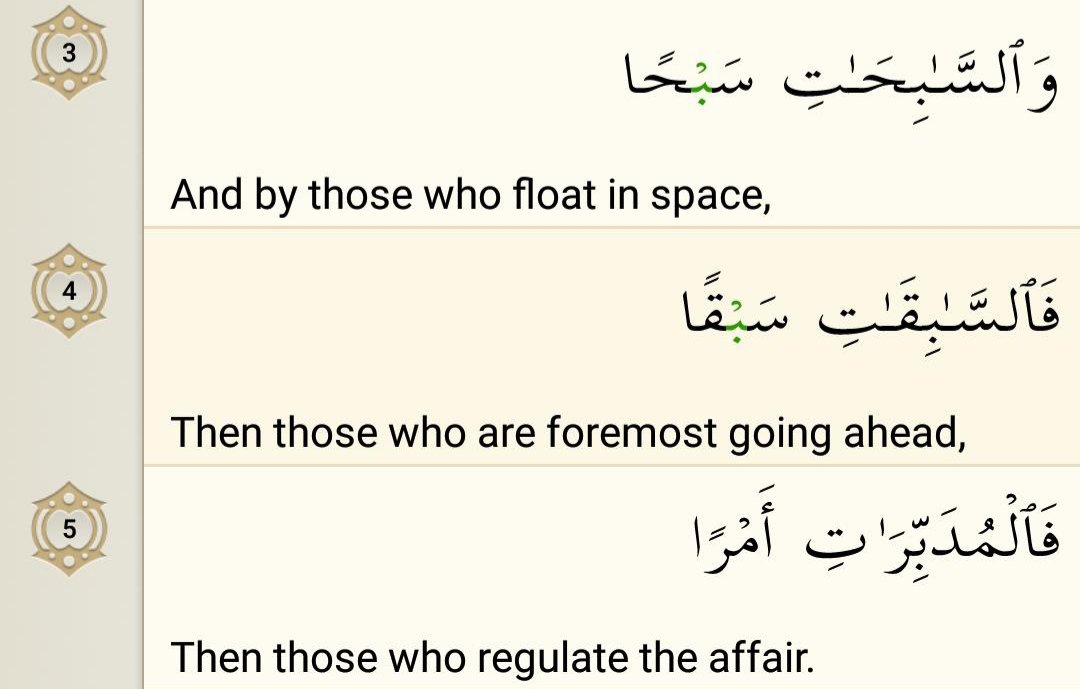
And by those who swim along
The term sabihat is based on sabh which means ‘a quick movement in water or air’. Hence, it is applied to swimming, or a swimming motion, or a swift gallop, or to perform a daily affair, quickly. The word tasbih ‘to praise Allah’ is from the same root, as if the one who praises Allah goes quickly forward in worship of the Lord.
If referring to angels it refers to the angel that swims seamlessly into the body. Those angels who pluck out from the depths and those who draw out gently the souls imply the angels, who wrench out the soul of man at death from the very depths of his body, from its every fiber.
This also means “those who glide about swiftly”, imply the angels, who hurry about swiftly in execution of Divine Commands as though they were gliding through space. These angels hasten out as in a race and hastening out implies that each one of them hurries on his errand as soon as he receives the first indication of Divine Will.
And by those that press forward as in a race
And by those (angels or winds) who arrange to do the Commands of their Lord
The term sabiqat is derived from sabqah which means ‘to precede’ and since the action is usually impossible without full speed, this term is sometimes used in the sense of ‘speed’, too.
The term mudabbirat is based on tadbir which means ‘to mediate upon, or consider the end of an action’, and since foresight causes one to arrange his affairs in a better manner, this word is used here in that sense.
Mudabbiraat is from “Da-Ba-Ra” which means the back end. Tadbeer means to keep going back and then coming forward again and again. Going in a cycle of Plan-Analyze-Act is the same model. Mudabbiraat is the feminine pl of mudabbir. Mudabbir is the one who makes tadbeer.
We are all mudabbir when we are following Allah’s orders because He Tells us to keep going back and then come forward again. So the design of an obedient servant is that of a mudabbir.
If referring to angels it is a reference to the angels that are assigned different tasks by Allah and they do a diligent organised job of executing those commands. These are the workers of the Kingdom of the Universe, who are conducting all the affairs of the world in accordance with Allah’s Command and Will. It refers to the angels who move fast and fluently to carry out the Divine Command. And in so doing, they race each other to fulfill their errands. Finally, they arrange the affairs according to Allah’s plan.
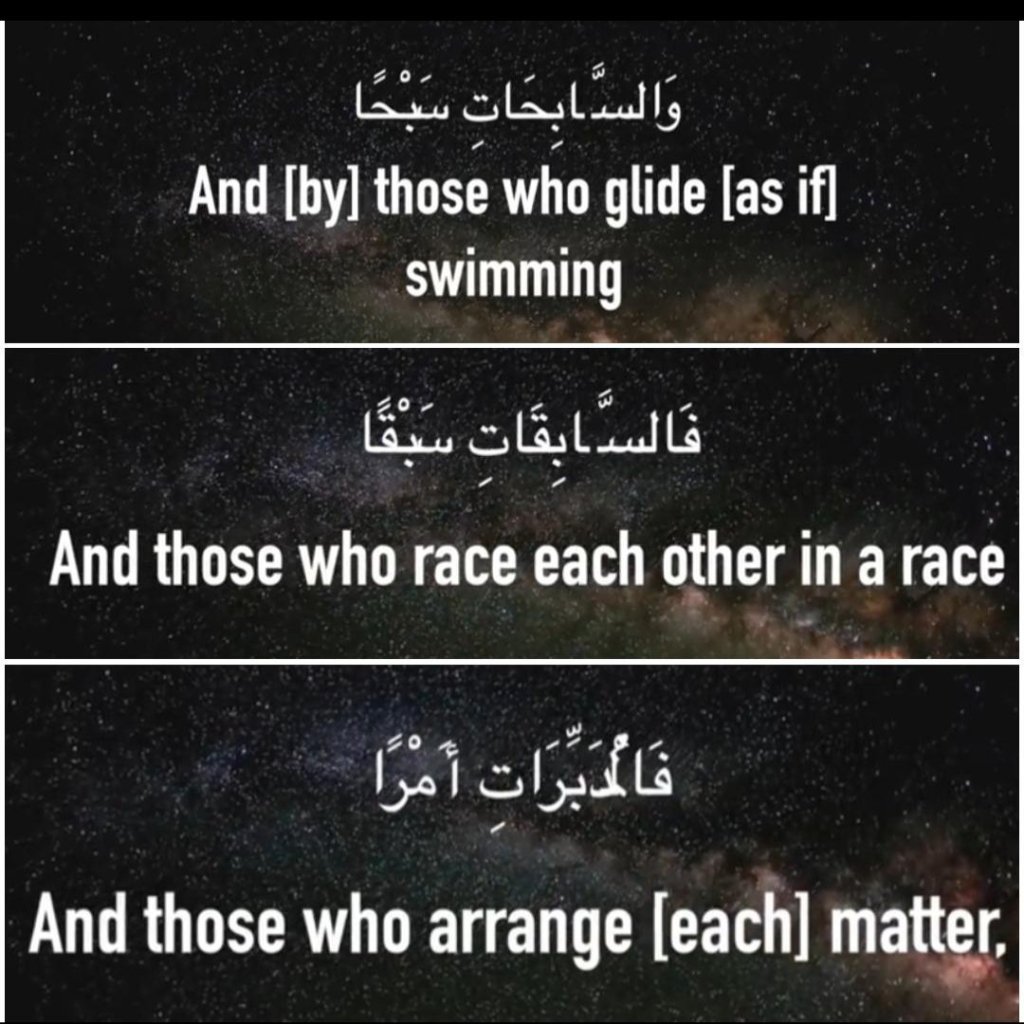
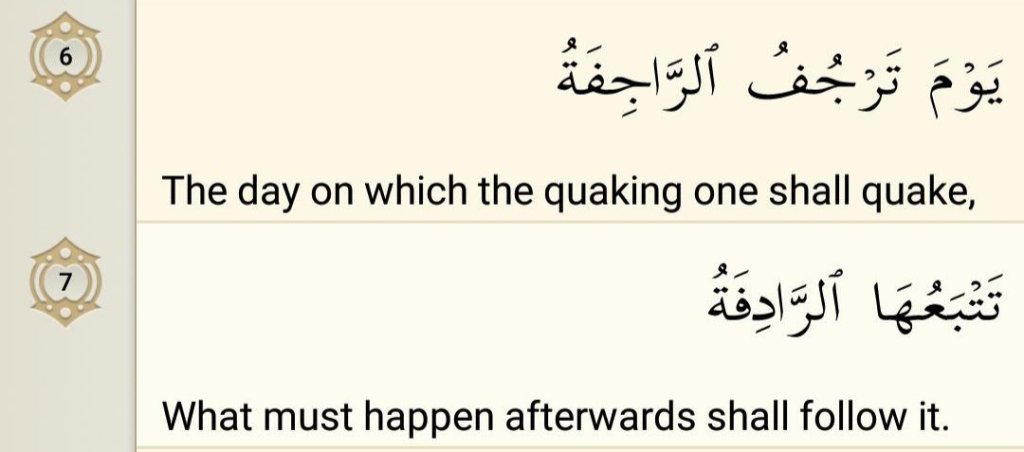
The Resurrection Will Happen with a Single Great Blast!
Now after the oaths sworn, Allah says when that which is meant to rattle will eventually rattle!
Rajaf means to rattle or to shake. Ragg is an initial jerk where something which was originally stationery suddenly gets put into motion. Allah in this verse does not mention the earth. Al-Raajifah means that which is meant to shake. This illustrates that the final destination and purpose of the heavens and the earth is the point where it is going to be shaken. Rajaf is a highly uncomfortable motion and depicts the motion and also the state of the person affected by the motion which is one of discomfort and disaster.
Then this will be followed by Ar-Raadifah which means a person or a thing streaming one after another. . _Radaf literally implies the person (Raadif) who sits behind you when you are riding a camel, horse or car for example. Wherever you go they will follow as they are on the same ride. Allah mentions that there will be another violent vibration and movement one successfully following another i.e. one meant to follow the other. The majority of scholars are in agreement that this verse refers to the second blowing of the trumpet and the previous verse refers to the first blowing of the trumpet. The first jolt implies the jolt which will destroy the earth and everything on it, and the second jolt at which all dead men will rise up from death and from their graves.
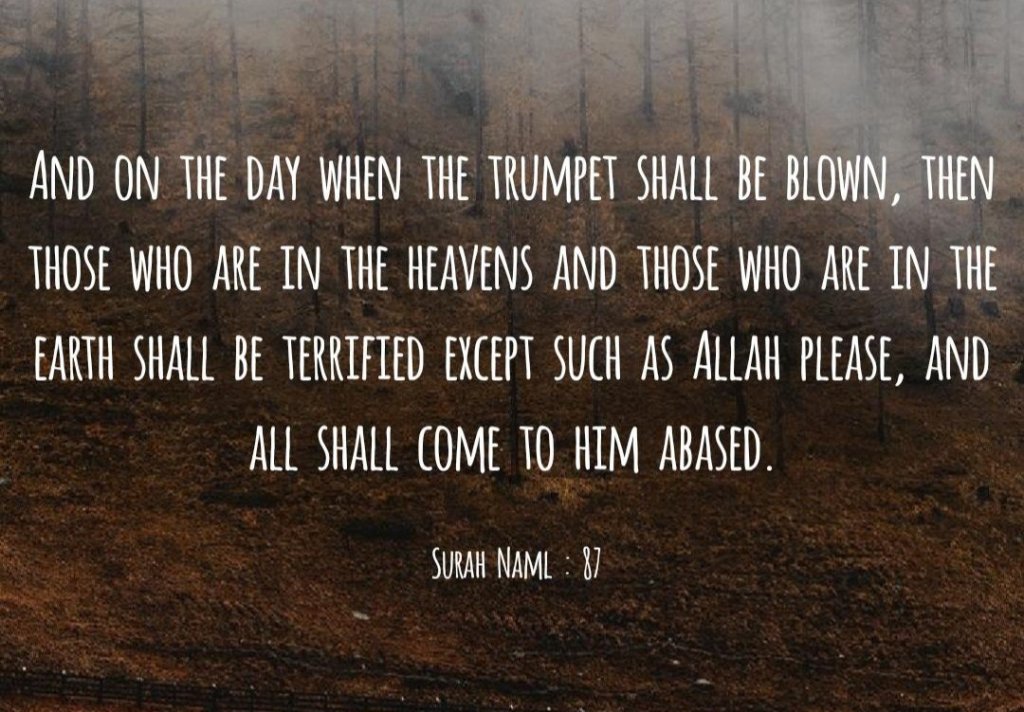
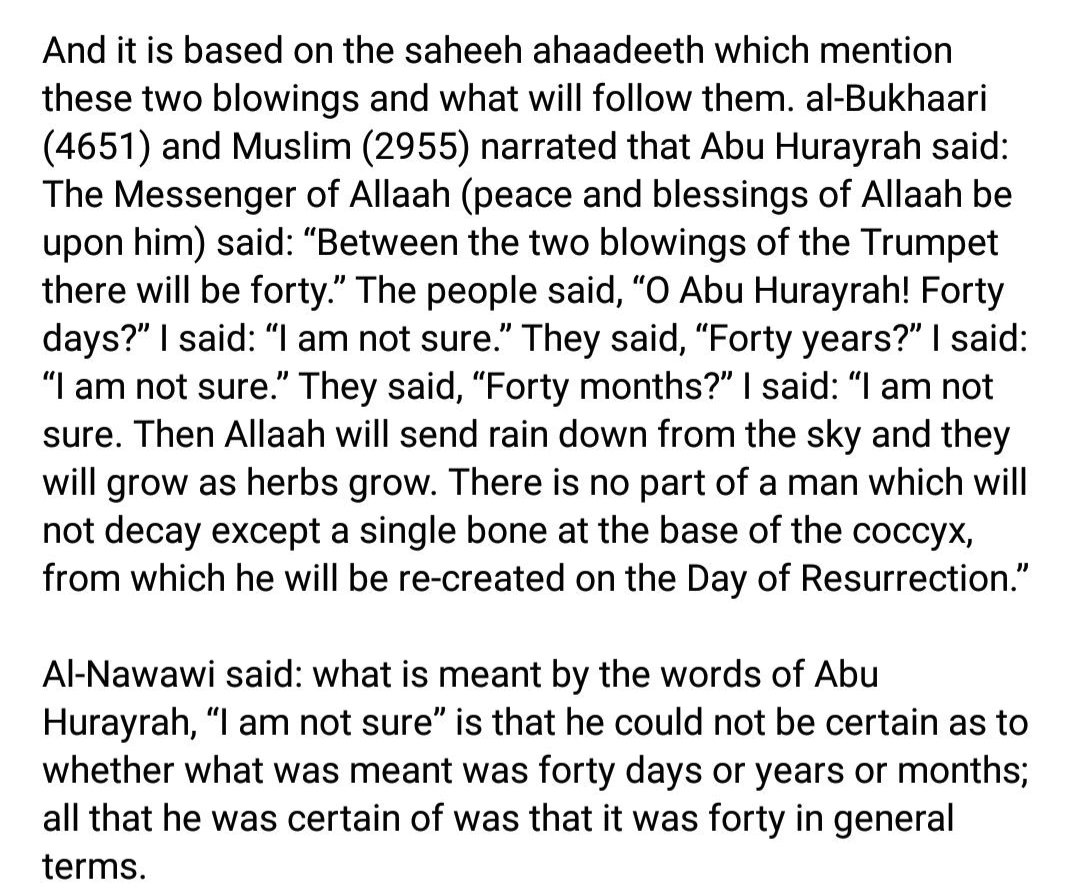
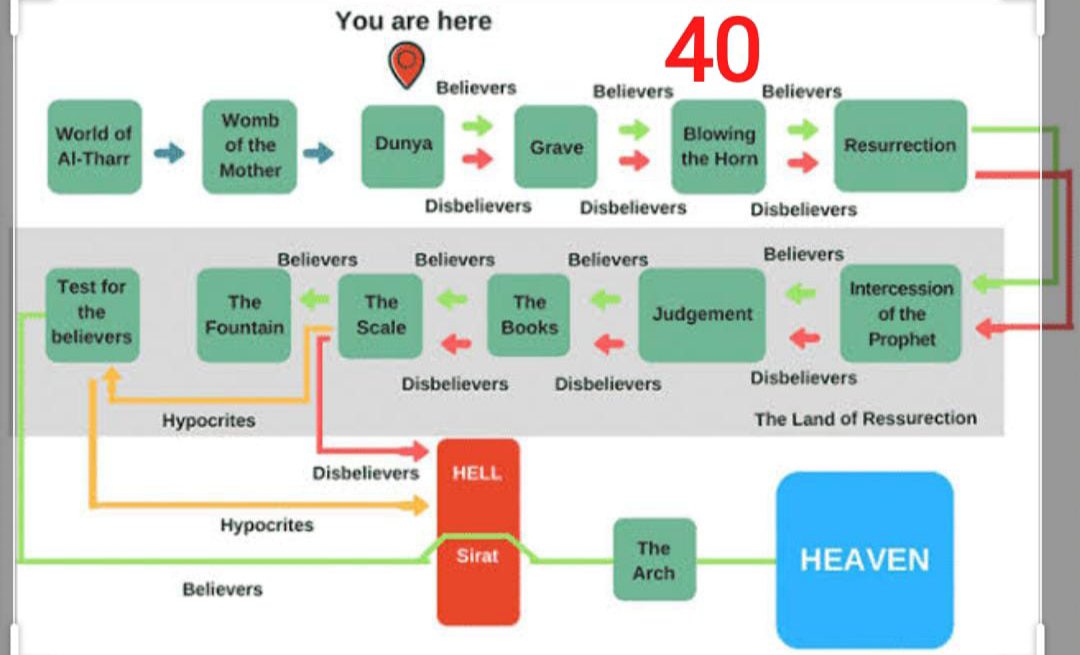
From Hadith we know there is a time period of 40 between the first and the second horn of the trumpet.
Technically between Rajifah and Radifah is a timeline of 40…
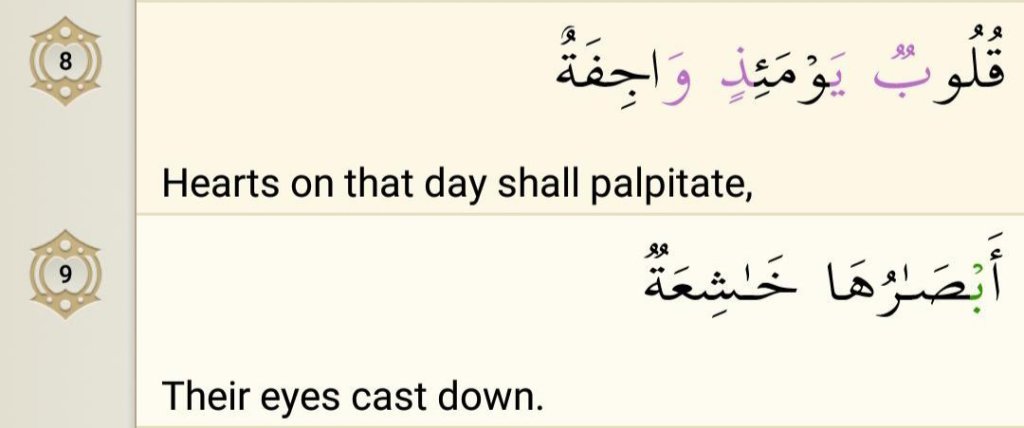
Then Allah says Hearts that Day will be in agitation, they shall palpitate…
The hearts are in such a terrifying state and it is being anxious for the Reckoning and penalty at the Judgment, the hearts of the criminals, the sinners and the unjust will severely tremble.
The term wajifah is derived from wajf which originally means ‘to move fast’; where the term aujaf is used with the meaning of ‘to make a horse or camel move briskly with a bounding pace’ and since a quick movement causes shaking and anxiety, this word is also used in the sense of ‘violent agitation’.
This inner anxiety is so violent that its effects appear in the whole body of the sinners. These are the hearts that never felt any fear of Allah in this dunia, and now its facing this anxiety in Akhirah. Whereas in contrast, the heart of a Momin constantly had fear of Allah in dunia, so in Akhirah it will be rescued from such a state.
Allah uses words “some hearts”, because, according to the Quran, only the disbelievers, the wicked people and the hypocrites will be terror-stricken on the Resurrection Day, the righteous believers will remain secure from this tenor. About them in Surah Al-Anbiya it has been said:
“The time of great fright will not trouble them at all; the angels will rush. forth to receive them, saying: `This is the very Day which you were promised’.”
(V: 103)
On that Day, not just the hearts but the eyes will subside too, coming to a stop and be dazed as if they are blinded by fear. The word absaaruha refers to the sight and the interpretation is that the vision will be directly connected to the hearts. What you see and how you perceive what you see is directly connected to what you have in your hearts. The eyes that are connected to the hearts that are petrified from the previous verse will be khashiya – overcome, overpowered, humbled. The hearts will be overwhelmed by the fear which will be presented to them.
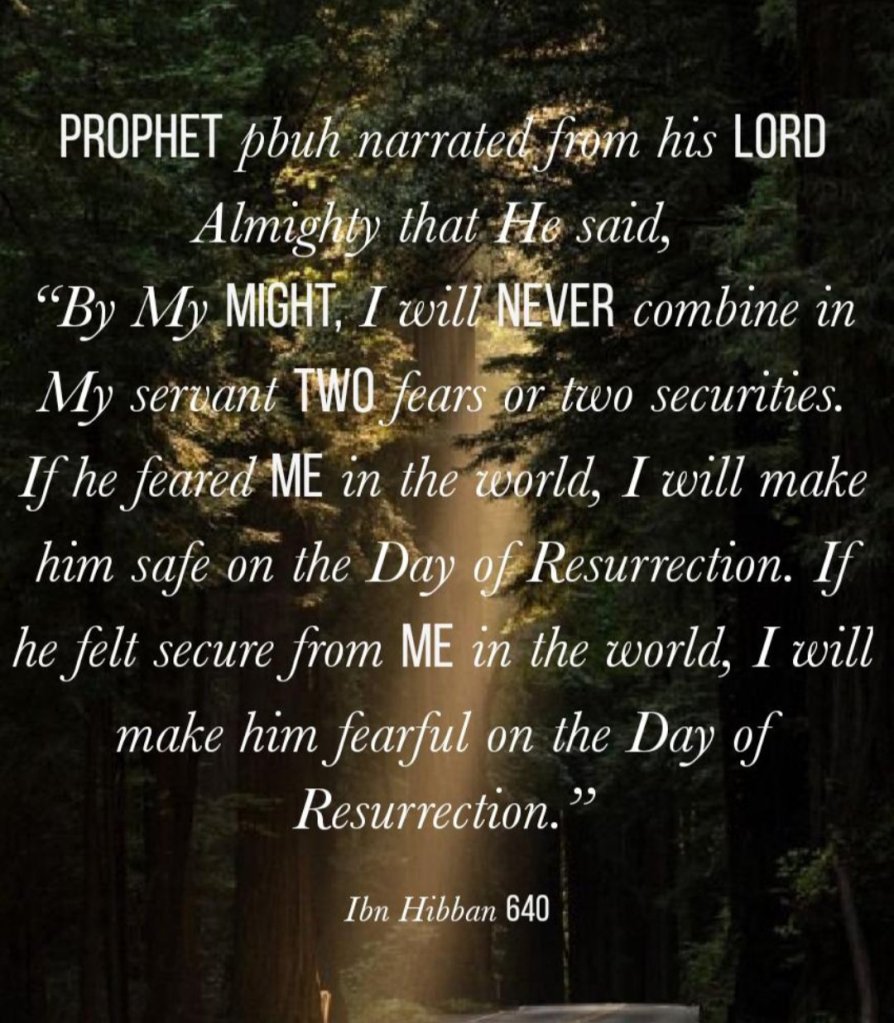
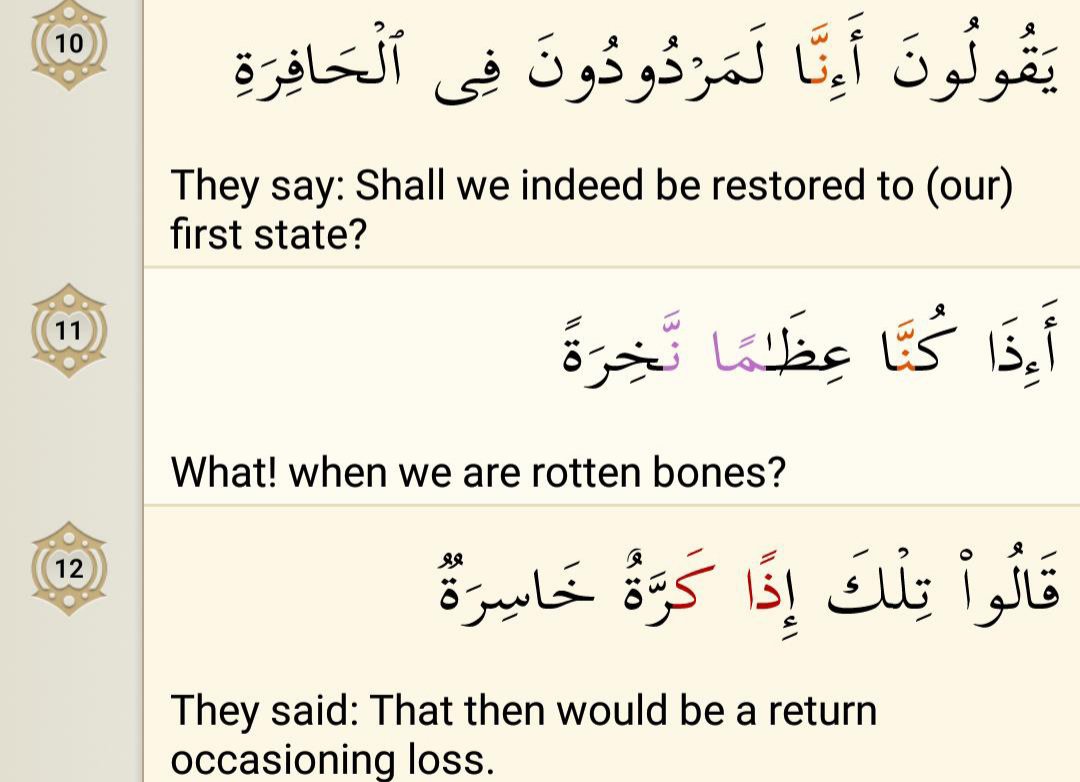
With this verse there is a transition which illustrates sarcasm of the disbelievers. The word radd in mardood refers to a kind of return where you went somewhere and you were not accepted and returned. Here the disbelievers are saying ‘What! Our death was not acceptable and now we have to be brought back to life?’ This is a means of sarcasm from the disbeliever. Al-Hafirah literally means a ditch in the ground that you dig. They are saying ‘Look our ditch is already dug; we’re not going to come out of this now. Resurrection after death does not seem something possible.
This is the very thing that the rejecters of the Resurrection always used to emphasize on and said that it was not believable that rotten bones could come to life again, because they imagined that the distance between rotten bones of dust and living creatures was too far. They had forgotten that they had been created from that very same dust.
When they were told that they would surely be raised back to life after death, they started mocking it, saying to one another, “Well, if we have really to be restored to our former state of life, then we would certainly be doomed.” Thier attitude showing no seriousness for the life after death and final accountability.
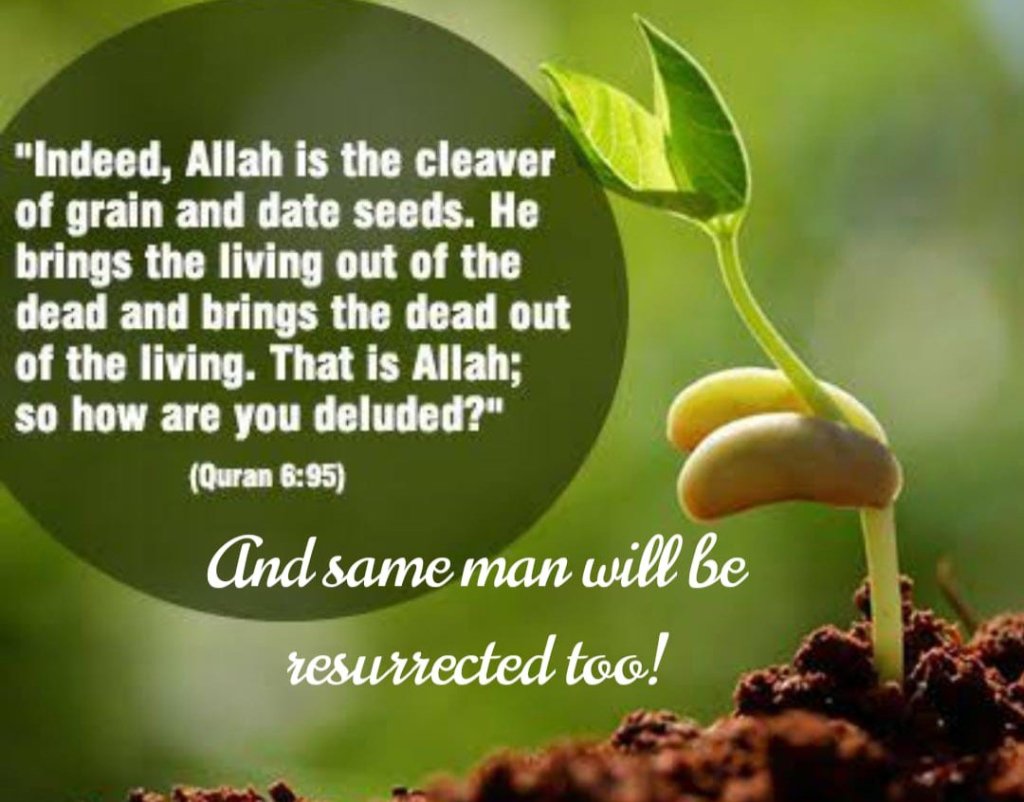
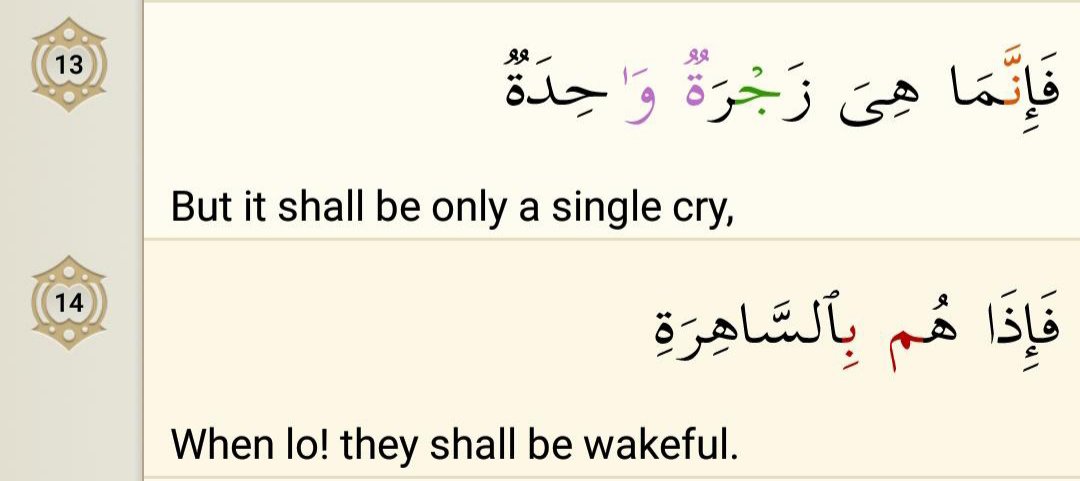
The disbelievers are mocking the resurrection of man as an impossibility, whereas it is not at all a difficult task for Allah for the performance of which He may have to make lengthy preparations. The term zajrah means ‘to cry for moving’, and, here, it means ‘the second blast’. For it only a single shout or cry is enough at which your dust of ash will gather together from wherever it lay, and you will suddenly find yourself alive on the back of the earth.
Thinking this return to be a return to loss, you may try to escape from it however hard you may, but it will inevitably take place; it cannot be averted by your denial, escape or mockery. It only depends on His command and when the second blow of the Trumpet occurs all rotten bones, which are scattered in the earth, will be gathered, revived and raised from their graves.
Explanation of word Sahirah
Sahirah means that your sleep has disappeared and that you cannot sleep anymore. It is used in reference to an open field as far as the eye can see and where the travelling Arab has nowhere to rest. He will be worried that someone will be able to see him from a distance and try to rob him. As a result, he loses his sleep since he feels too exposed in the open. So now Allah says they will be in a place where they will lose their sleep. Some scholars have commentated that this word is used to illustrate a mirage. For example when you are in a desert and you think you see water which is a mirage you lose sleep as you now have a goal in sight. Sahr literally is a kind of ground that is pale and flat as far as the eye can see and some have commentated that this is the land where all will be gathered for resurrection. Another opinion is that this is like losing your sleep when coming out of the grave as once out you will lose your sleep forever.
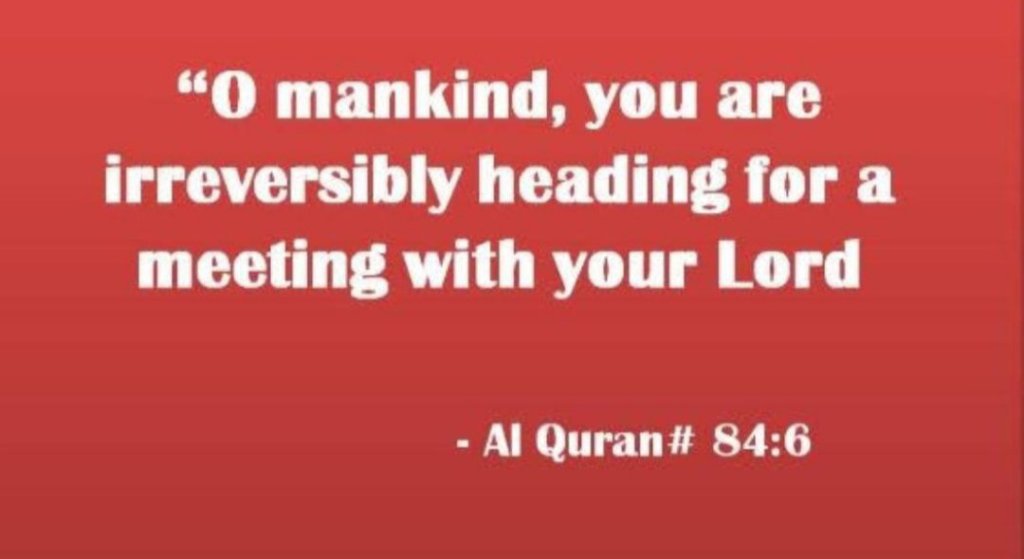
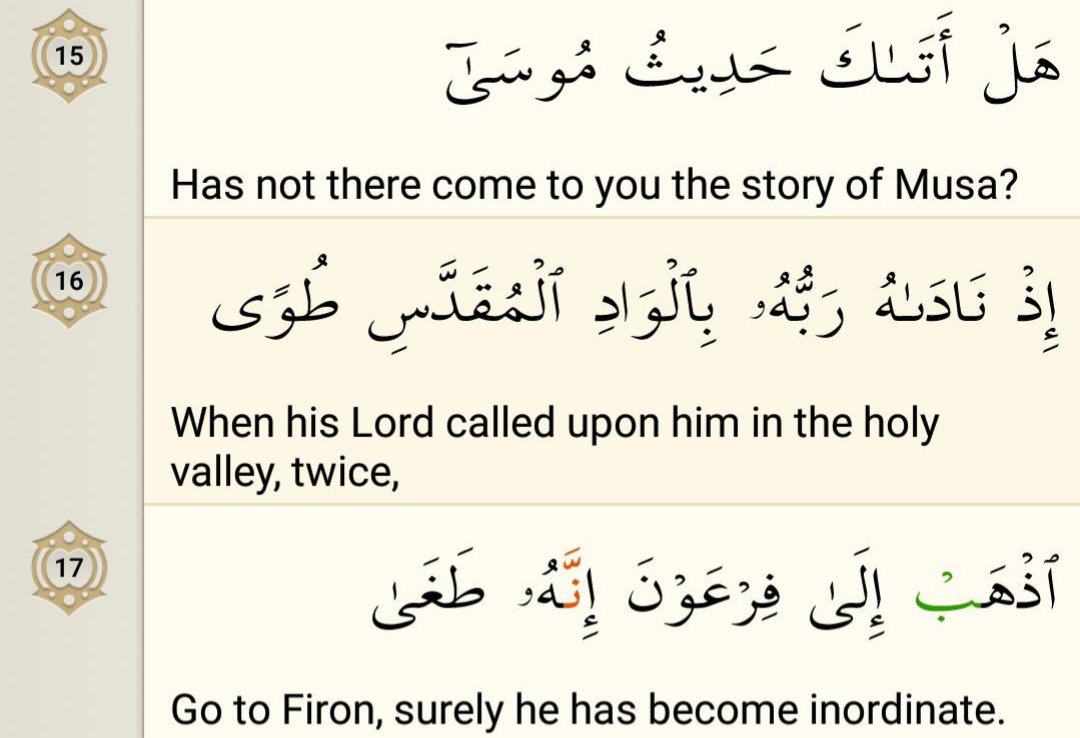
After a considerable description in the former verses about Resurrection and the rejection of the disbelievers, in the upcoming verses the painful end of Firoun (Pharaoh), one of the great arrogant blasphemers and rebels of history, is pointed out, to show Pagan Arabs that those who were stronger than them could not stand against Allah’s wrath and punishment, and encourages the believers not to be afraid of the apparent strength of their enemies, because it is easy for Him to destroy them all.
“Has the story of Moosa reached you?”
It is interesting that Allah addresses the Prophet pbuh and begins with a question to attract the attention of the listener in order to make him ready to hear this wonderful story.
Even though the disbelievers are still listening they are no longer being addressed. The word hadith is used for something that is so old that when you are reminded of it, it sounds like it is new. We are being reminded here of Moosa’s a.s legacy and we will feel like we are hearing it for the first time. That is how relevant this story is to this discussion.
“When his Lord called to him in the holy valley of Tuwa”
‘Tuwa’ may be the name of a sacred valley just below Mount Sinai, which was located in Sham (Damascus) between Madyan and Egypt, and where Moosa a.s subsequently received the first light of inspiration from Allah.
There is a parallel here as the Prophet pbuh himself was called to the cave in Mount Hira and given revelation. Here the Prophet pbuh is reminded that Moosa a.s was also called to the valley of Tuwa for revelation.
Go to Firoun ; he has transgressed all bounds (he has engaged in an act of rebellion)
The word ila here means to go ahead in that direction, meaning get started on your mission. The Prophet pbuh is to go to the Quraish, the disbelievers, just like Moosa a.s had to go to Firoun.
Tughyaan is used when a pot is filled with water to the extent that the water spills over the top. Firoun exceeded his limits and did tughyaan in two ways that we learn of in the Quran by declaring himself Rabb (lord) and by enslaving Banu Israel. The message here is that Firoun rebelled just like you (the Quraish) have. What this illustrates is the problem of the Quraish is not that they do not believe in the hereafter or that they are sceptical of it but their love of rebellion and having limits imposed on their freedom. This is your crime (the Quraish) and the crime of Firoun before you.
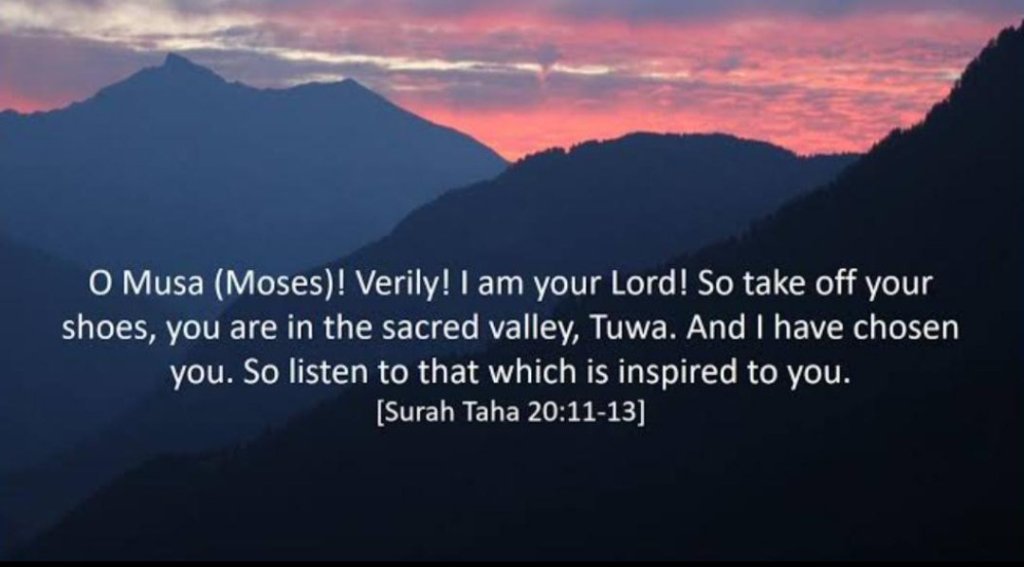
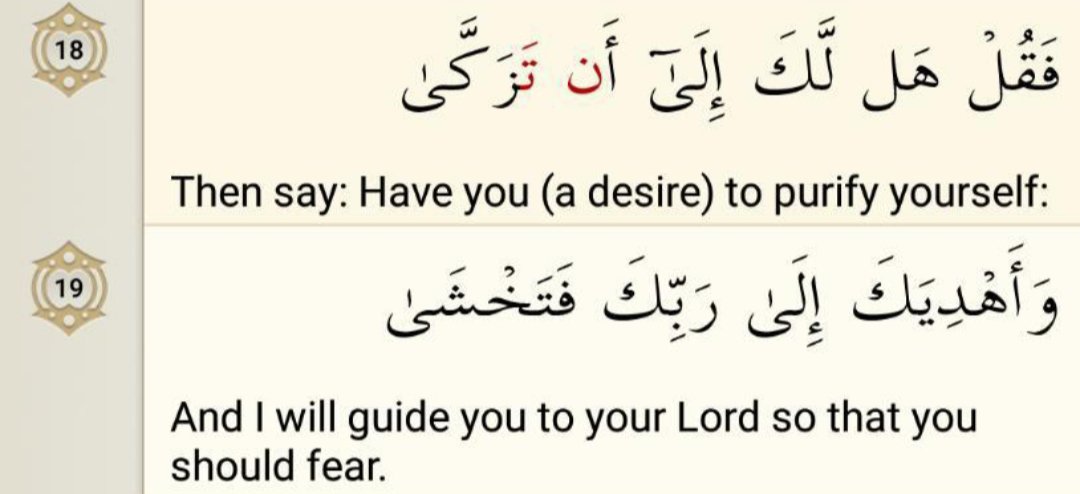
Allah directed Moosa a.s to a mission, and to go to Firoun and call him towards True Faith. Allah is commanding Moosa a.s to say to Firoun that would he like to reform himself? i.e. does he has any inclination inside him at all that makes him cleanse himself of the filth that he is infested with? A voice of reason inside him that wants to make him a better person?
The mission of the Messengers was tazkiya (purification) to take the elements of a person’s personality that are flawed and evil and cleanse oneself of them. And Moosa a.s was assigned with the same mission. Many people think Moosa a.s was sent to Egypt back to set the Israelites free, but that is not true. His foremost task was to call people towards tawheed and true path.
One thing to note here is that in other places in the Quran you will find a lot more detail on what happened at Tuwa but not here. The reason is that in the Quran the purpose is not telling the story. Only the part of the story that fits in with the discourse that precedes and follows is cited. Moosa a.s is mentioned in over 70 different places in the Quran but only the part of his legacy that is relevant to the discourse is mentioned. None of the details of Moosa a.s trip to Tuwa that are irrelevant is mentioned here. This is to do with the brevity of the Quran and the meticulous organisation of the Quran.
Moosa a.s is saying in next verse that let me guide you (Firoun) to your Lord and give you knowledge of Him, so that as a result you will be overwhelmed by the fear of something greater than yourself. Because Firoun was proud and considered himself the greatest of all. But here he’s been told that a Lord exists who is greatest of all. This indicates that true knowledge leads to fear and that is why the people mature in knowledge are called ‘uloo al-baab’ (the people of pure intellect) by Allah in Quran. It is important to bear that this story is being narrated in order to draw a parallel with Prophet pbuh and the Quraish.
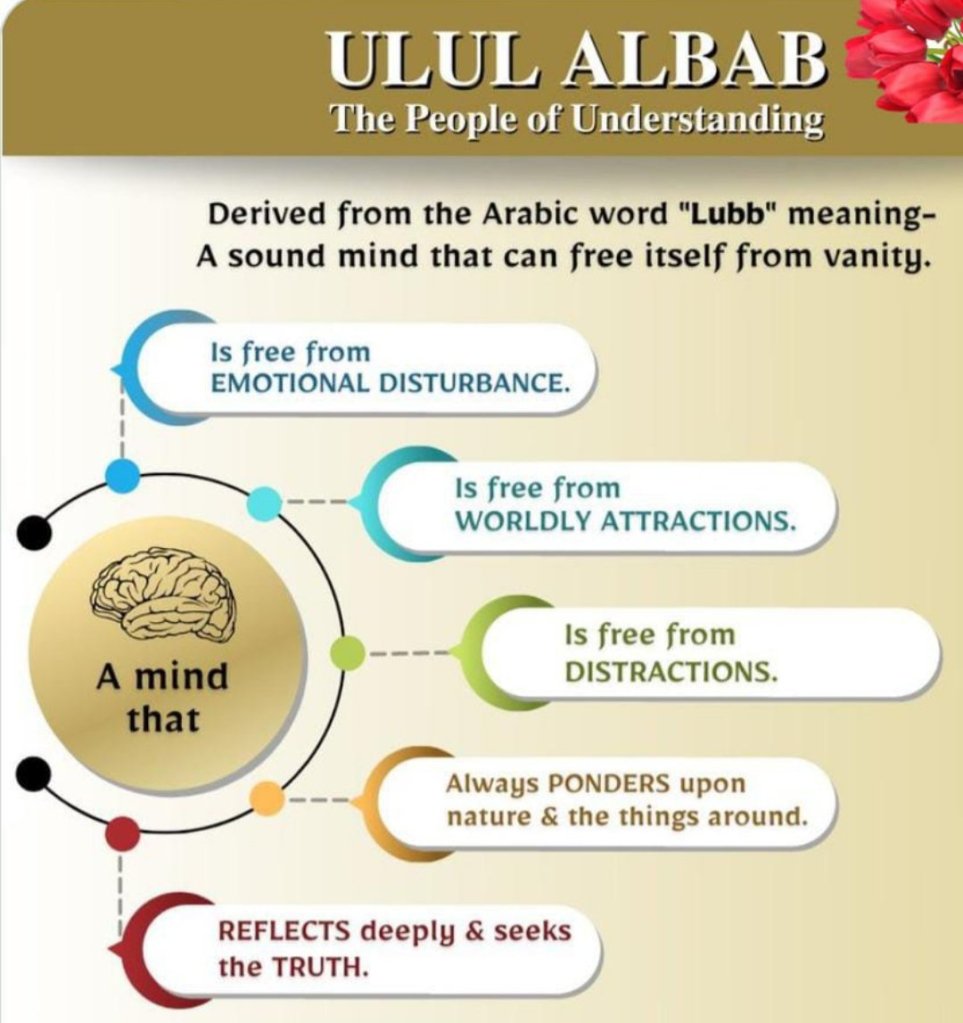
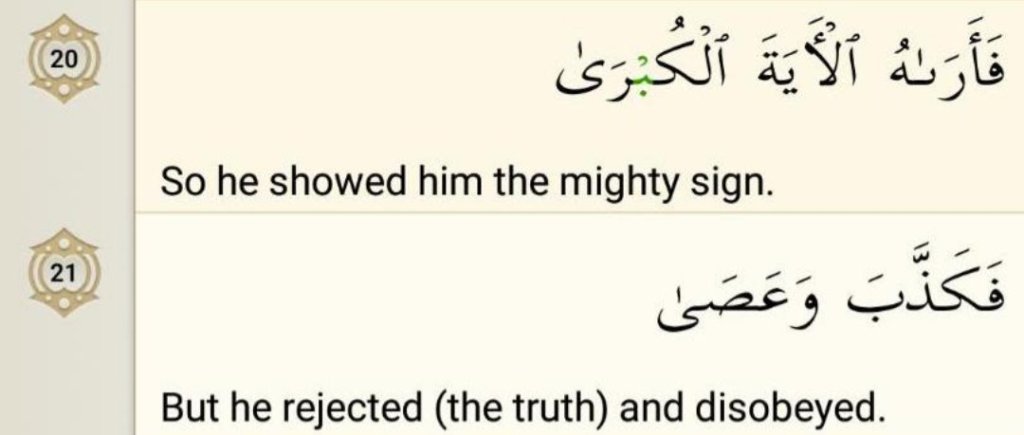
The message here is that in order to help Firoun find that goodness inside him, Allah showed him the ultimate sign (ayat ul-kubra). Kubra is the feminine equivalent of Akbar (as in Allahu Akhbar) and is a superlative adjective in Arabic. We know that Moosa a.s was given many miracles but of all the miracles given to him, Firoun was most afraid of the staff turning into a snake. We know this because Firoun hired magicians to try to replicate only this act and not the other miracles of Moosa a.s. The parallel drawn here between Prophet pbuh and the Quraish is that the Messenger pbuh also gave the people the ultimate sign – the miraculous Quran which the Quraish labelled as magic, poetry, speech of soothsayer.
Firoun lied against Moosa a.s, propagated against Moosa a.s and lied against the miracle that Moosa a.s showed him calling it a lie, magic and trickery and he also lied against or denied his own conscience which deep inside was telling him Moosa’s a.s message was the truth. This also relates back to the Quraish who are doing the exact same thing with the ultimate sign of the Prophet pbuh by lying against the truth, even though deep inside they knew it to be true.
In addition to lying Firoun did asaa which means to disobey. The word asaa is to deliberately refuse to do something that you know to be good and its use is perfectly appropriate in this verse for that reason. This shows that rejection is the primary step in transgression, as well as faith, and admitting the truth is paramount to obedience.
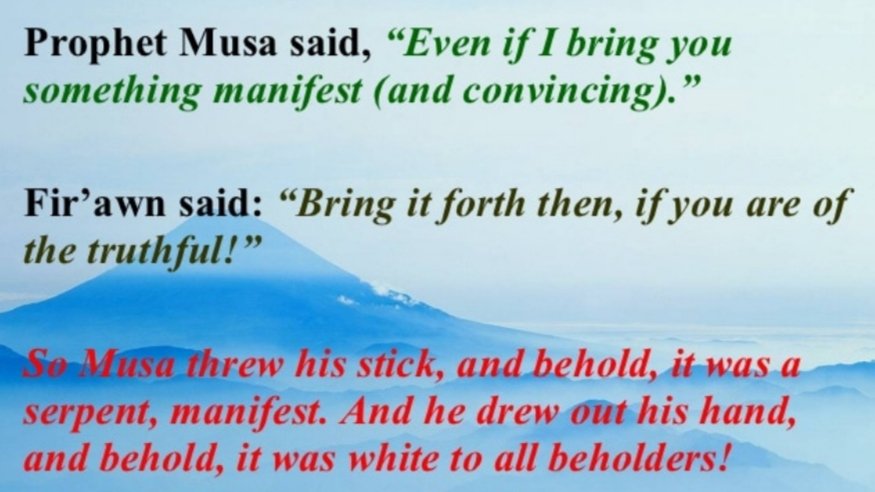
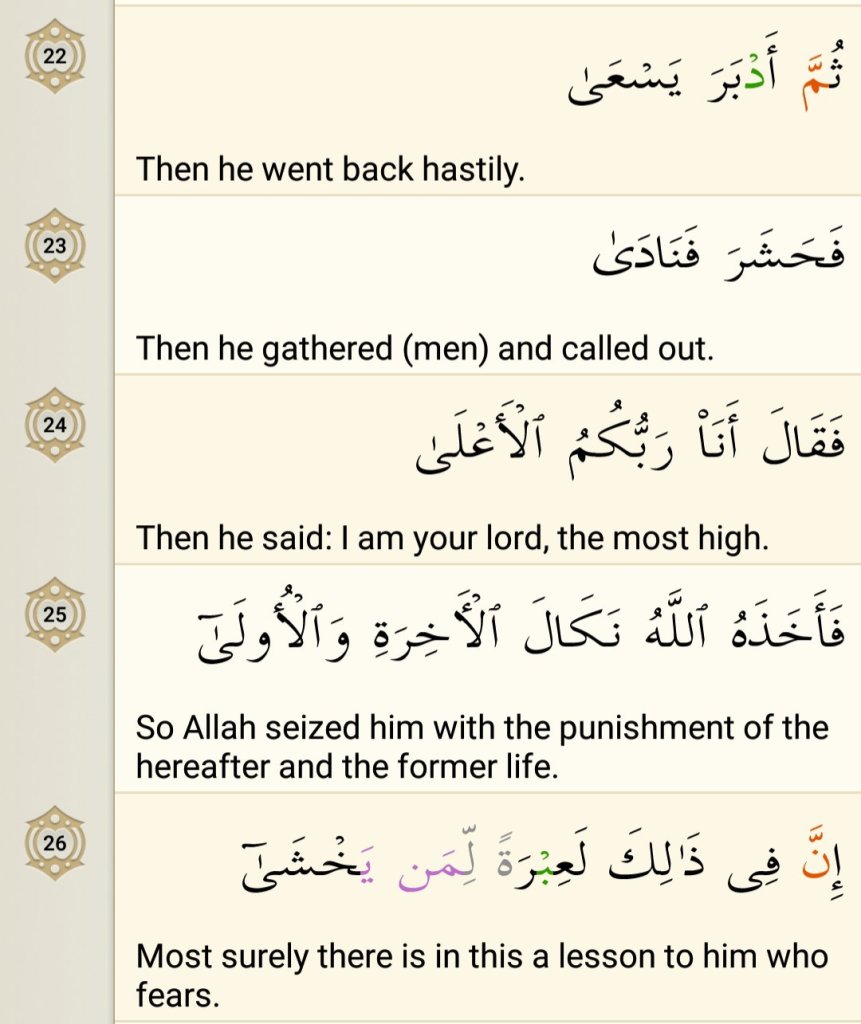
Now Allah illustrates Firoun’s desperation. Sa’i is a state faster than walking but slower than running. The image here is that Firoun is restless and pacing up and down thinking of what to do next against Moosa a.s dawah which is spreading no matter what evil he plots against it.
Firoun gathered all the people forcefully so that he can re-iterate to them the belief they are supposed to have i.e. the official religion of the state. He called out to them and made a proclamation.
He did not quit with these plots and he made claims with the worst statements. ‘I am your supreme Lord’, he said
This claim was already know to his people but Firoun felt the desperate need to remind his people of this. The word supremacy illustrates that there is someone else claiming to be a Lord and Firoun realises he is in competition with that Lord and felt the need to tell his people that he was the higher Lord as the other Lord was beginning to be believed in by his people. This was Firoun’s shirk. Thus, in fact, he called himself a god and supreme deity not in the religious but in the political sense. What he meant was that he possessed the sovereign rights: no one beside him had the right to rule in his kingdom and there was no superior power whose orders could be enforced in the land. The shirk of the Quraish was allegiance to their traditions with the same net result. The Quraish came out to remind people of their traditions.
Then Allah seized him and made ‘nakaal’ out of him. Nakaal in Arabic is used for an anklet or a bracelet which in ancient prisons was tied to a wall so that you cannot move. So a nakaal is an anklet or bracelet which either restricts your movement or forces your movement. Allah took Firoun and made a nakaal out of him thereby using him as a deterrent i.e. don’t be like Firoun because he is the worst kind of example for the last of people to walk this earth and the first people to walk it. He was thus subjected to punishment of both dunia and Akhirah.
Surely in all this is a lesson for him who fears Allah. This verse clearly shows that learning a lesson from these events is possible only for those who, more or less, fear Allah and possess a feeling of responsibility in their hearts.
Yes, that was the destiny of Pharaoh, the blasphemer; an example to make other pagans and chiefs of the Arab disbelievers and all those who follow on the path of Pharaoh, in any age, understand the facts and know that Allah’s law is always true, firm and unchangeable.
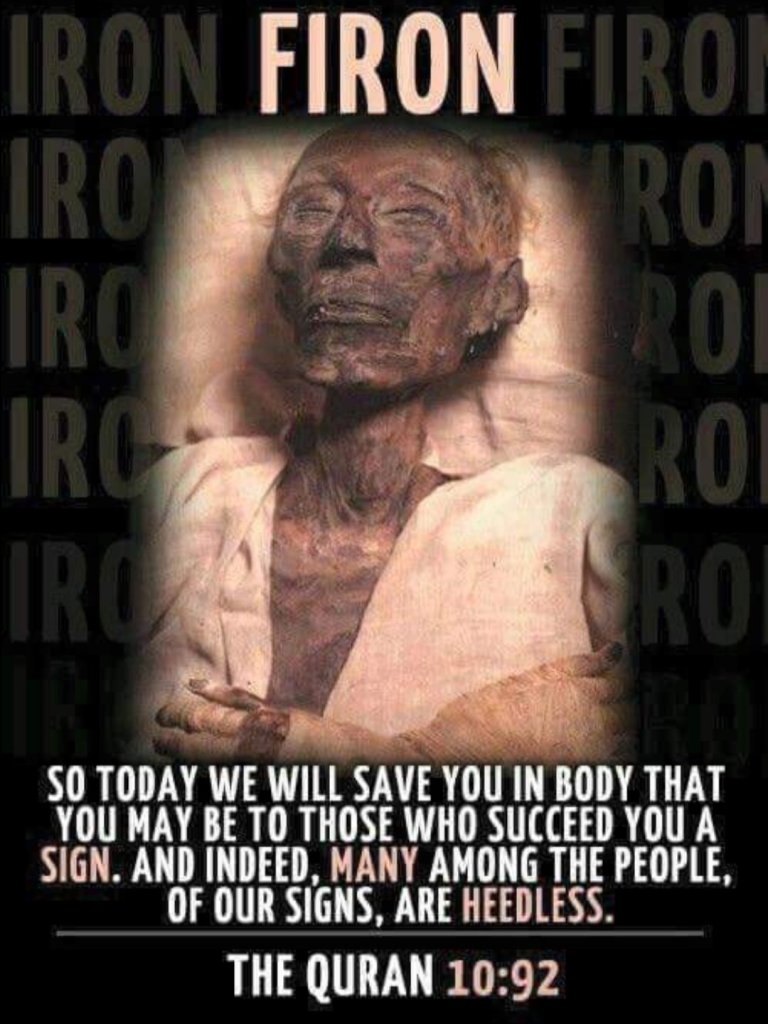
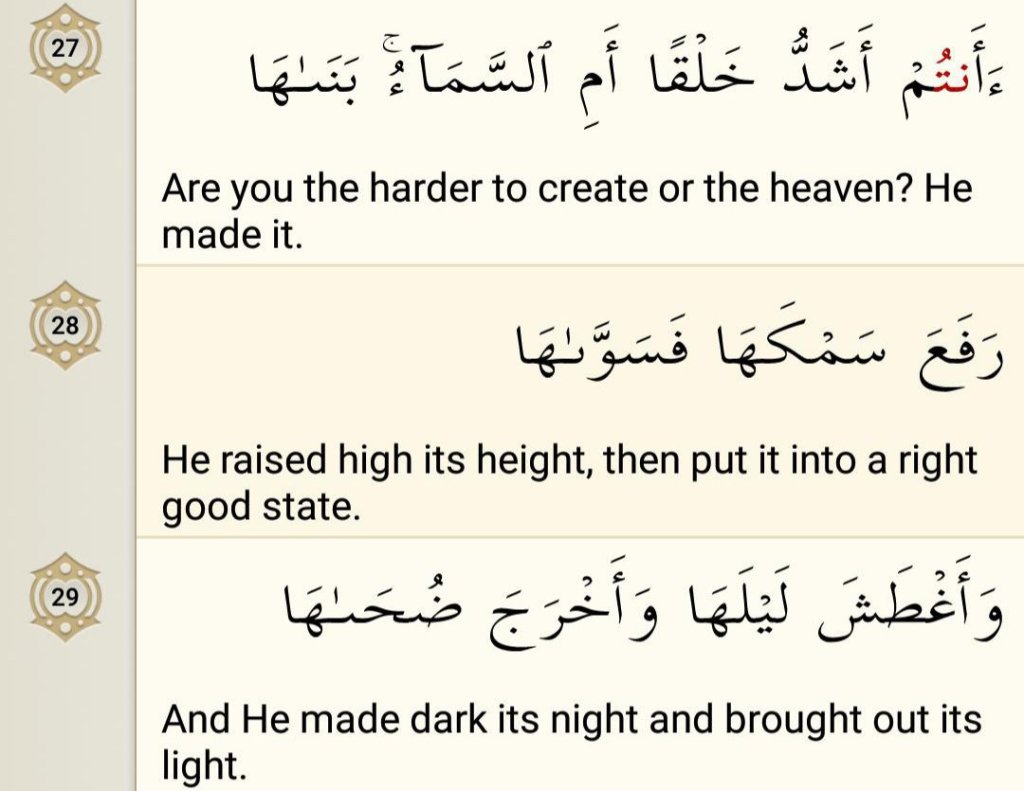
A Reason For the Resurrection: Are You More Difficult to Create or the Heaven He Built?
With the story of Moosa a.s and Firoun as a lesson for all transgressors and rejecters, our attention is turned to the Resurrection by Allah. Again, the statements are about some attributes of Allah’s infinite Power, as a proof to the possible existence of Resurrection.
Here, creation implies the recreation of men, and the heaven the entire firmament which contains countless stars and planets, and innumerable solar systems and galaxies. By that Allah means to say: “You think that your resurrection after death is something extremely improbable and you express wonder saying that how is it possible that when our bones will have decayed and become rotten the scattered particles of our bodies will be reassembled and made living once again? But have you ever also considered whether the great universe is harder to create or your own re-creation in the form in which you were created in the first instance? Allah Who created you in the first instance cannot be powerless to create you once again.
About the heavens, Allah elevated its roof and perfected it. Samk is the top of something for example the highest part of a camel’s hump is called a saamik. Allah says here that He elevated the highest part of the sky to the point that we cannot even see it and then he moulded it to perfection.
Then Allah talks of darkness of the night highlighting the difficulty with which one can see and things become blurry where the night is made so dark that it becomes hard for you to see. And then out of this darkness He brings out the time of the morning that is the brightest and easiest in which to see (duha).
Allah here contrasts two things. First, figuratively speaking, He made the night so dark you could not distinguish falsehood from truth, and then He brought a day so bright that there is absolute clarity of one thing over another. The dark night where nothing is clear, out of which Allah brought this clear day and revelation.
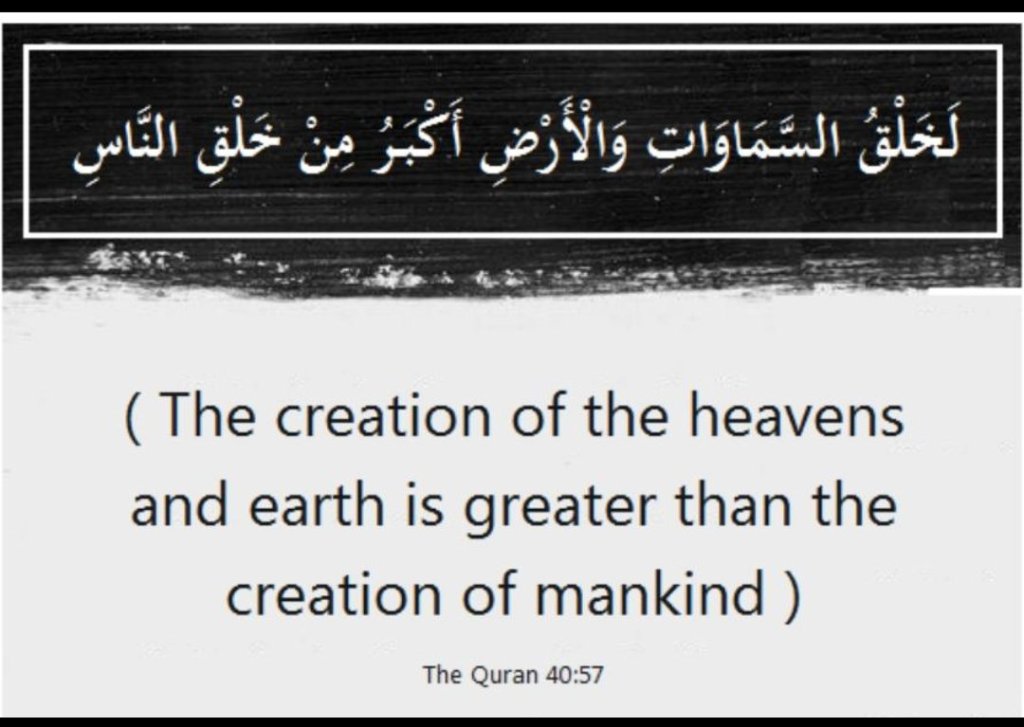
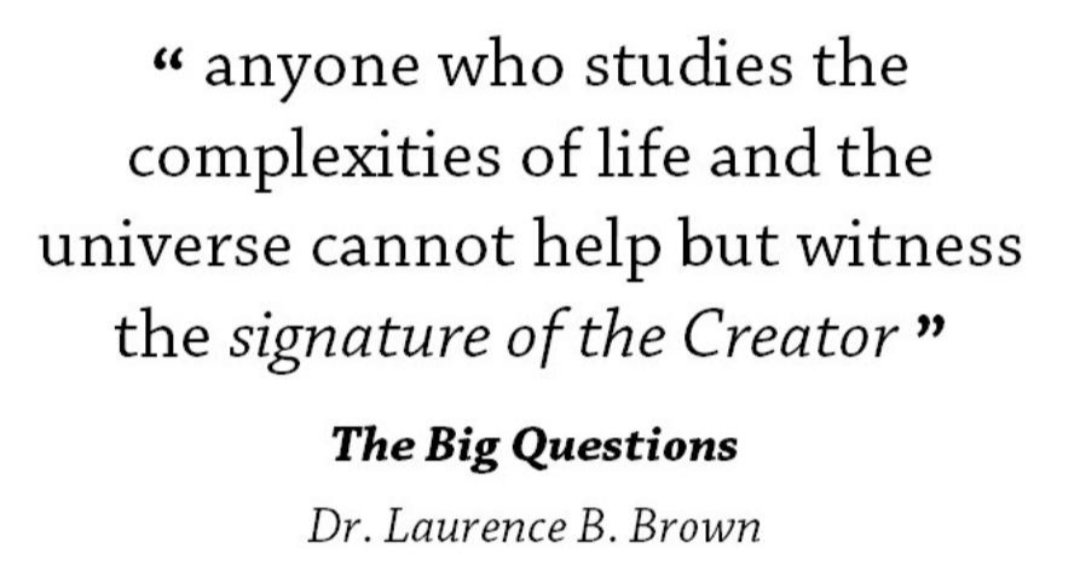
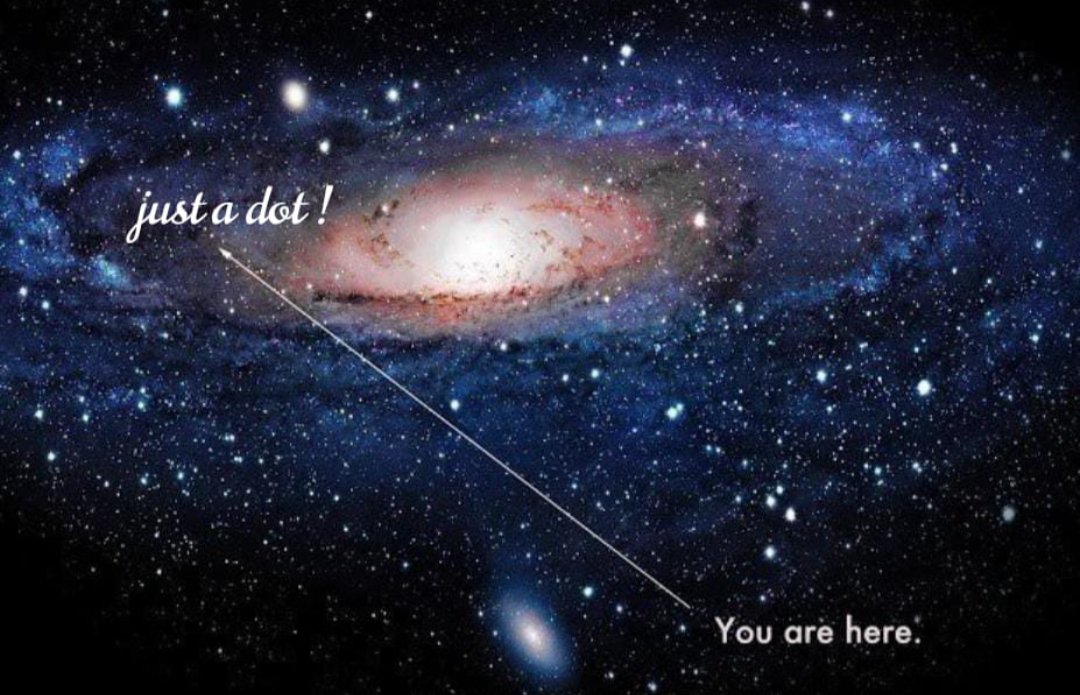
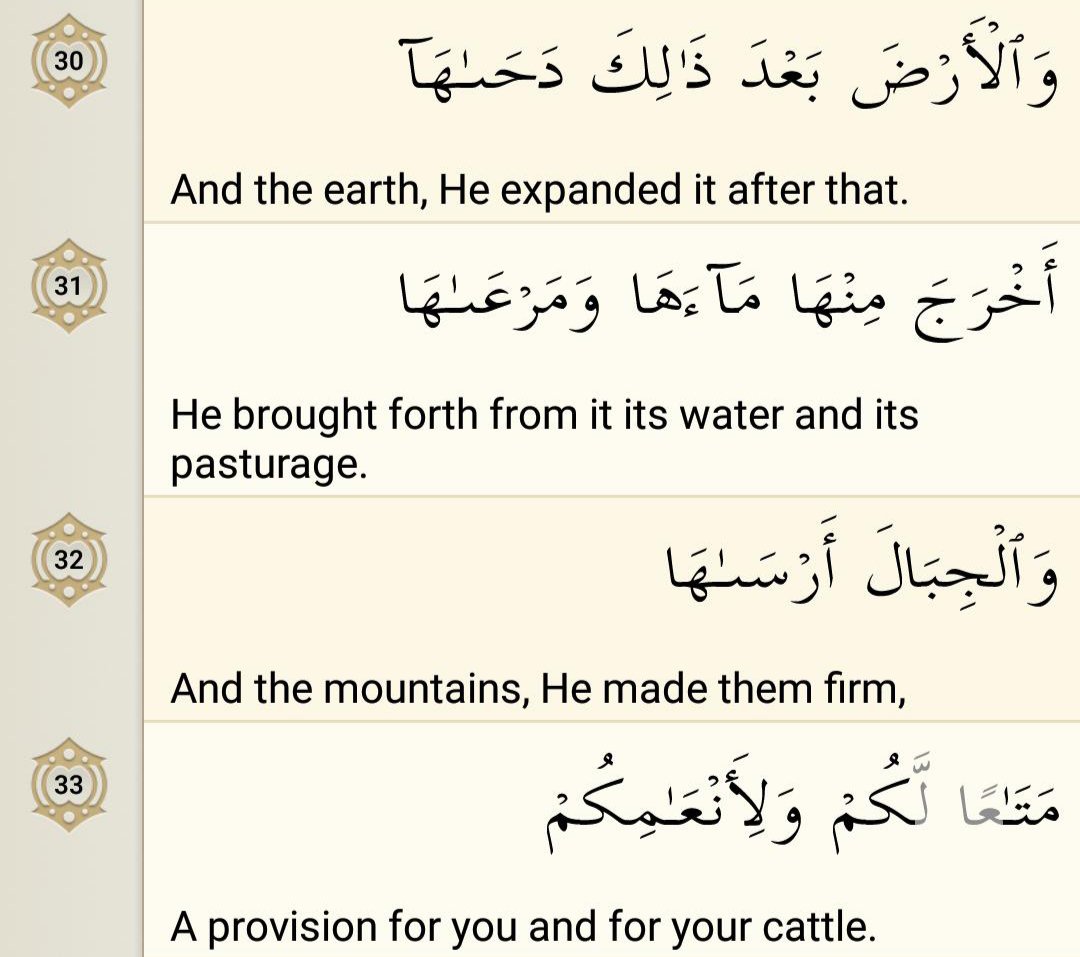
Now Allah mentions the earth that how He expanded it. In the classical Arabic daha means to smoothen and to spread out and Allah is illustrating the powerful creation of the earth and how widely it is spread. Allah firstly says he made the earth flat, smooth and expanded and then he drew from it water and these pasture lands. “Pasture” here does not only imply pasture and fodder for the animals but all kinds of herbal produce suitable for consumption both by man and by animal.
And the mountains He has fixed firmly. Irsa means to put an anchor down on a large ship. So Allah has created mountains like they are anchored into the ground. The idea being that they are not like other buildings that you can just remove. They are fixed and are very tough in their construction. Irsa is also used for pegging i.e. to peg something into the ground.
After speaking about the earth and the sky, Allah says that all of this is a provision for us to use. It is a means of life for both man and animal. All these are a manifest sign that these are not chance happenings of the purposeless works of a care-free person but each one of these has been arranged purposefully by a Supreme, Wise Being. Now every sensible and intelligent man can consider for himself whether the necessity and occurrence of the Hereafter is the requirement of wisdom or its negation. For there could be nothing more purposeless than delegating to man vast powers of appropriation in the earth and providing him an opportunity to do good as well as evil deeds but then failing to ever subject him to accountability.

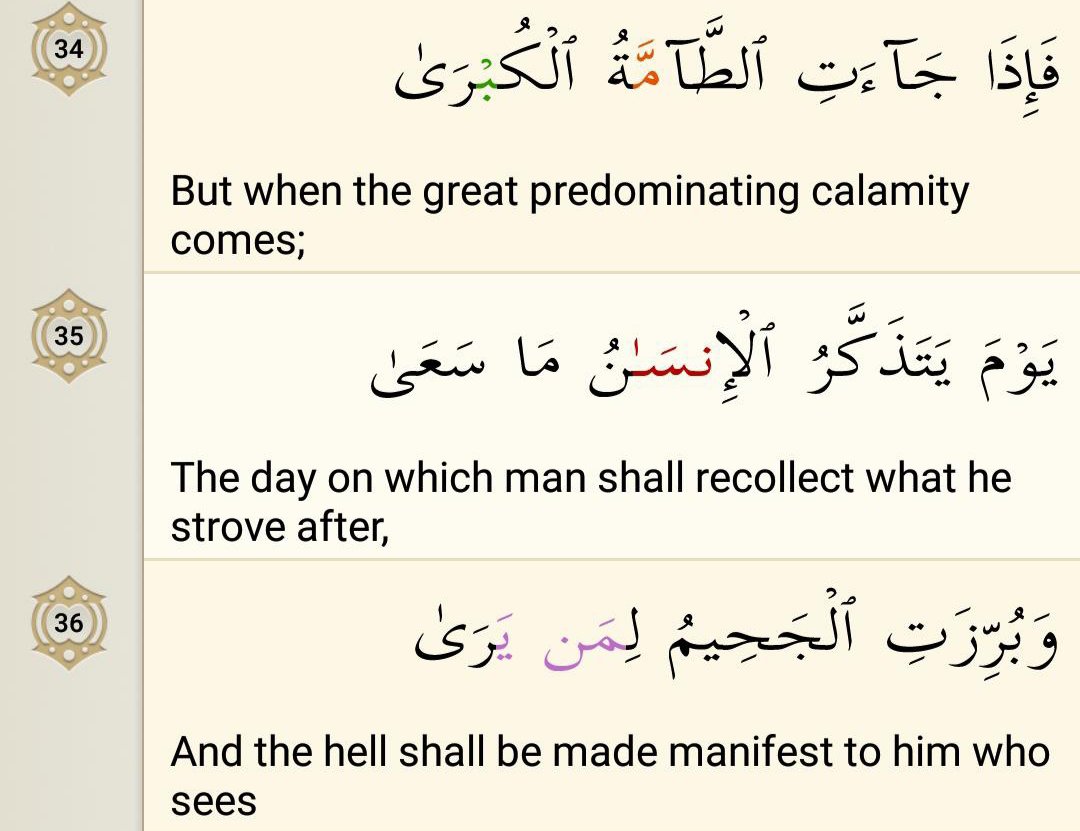
Now Allah talks about the Resurrection and for that the words at-Taammat alkubra have been used. Taammah by itself is a grievous calamity which afflicts everybody. Then it has been further qualified by the word kubra (great), which shows that the mere word taammah is not enough to describe fully its intensity and severity.
Taammah is a calamity that is so complete and overwhelming from every direction that there is no escape from it. It’s the ultimate calamity that all of a sudden arrives and makes its grand entrance.
And when that arrives, man will thoroughly remember everything he did. This word means that every last memory will be recollected and man will remember every last thing he did and rushed towards.
The crime of the disbelievers mentioned in this Surah is their speech and their scepticism of the Hereafter. However, Allah has seen through their speech and highlighted that it is a result of the things they rushed towards and on the Day of Resurrection they will remember not only their speech but the efforts and motives behind their speech.
And the HellFire will be brought forward in full view for all who see. Burriza is used to pull something out and place in front of someone. Jahama is a word used when a lion is staring at you with hungry eyes. It is one of the names of the HellFire and is also used in a blaze that is so intense that it almost looks like it is staring at you. So, this enraged HellFire will be brought forward for anyone to look at meaning they will have to look at the rage of it. Allah is now saying you will see eventually when the fire is brought out in front of you.
When man will see that the same Day of accountability of which he was being foretold in the world, has come, he will start remembering each one of his misdeeds done in the world even before his records are handed over to him. Some people experience this even in the world. If at some time they come across a dangerous situation suddenly when death seems to be staring them in the face, their whole life-film flashes across their mind’s eye all at once.

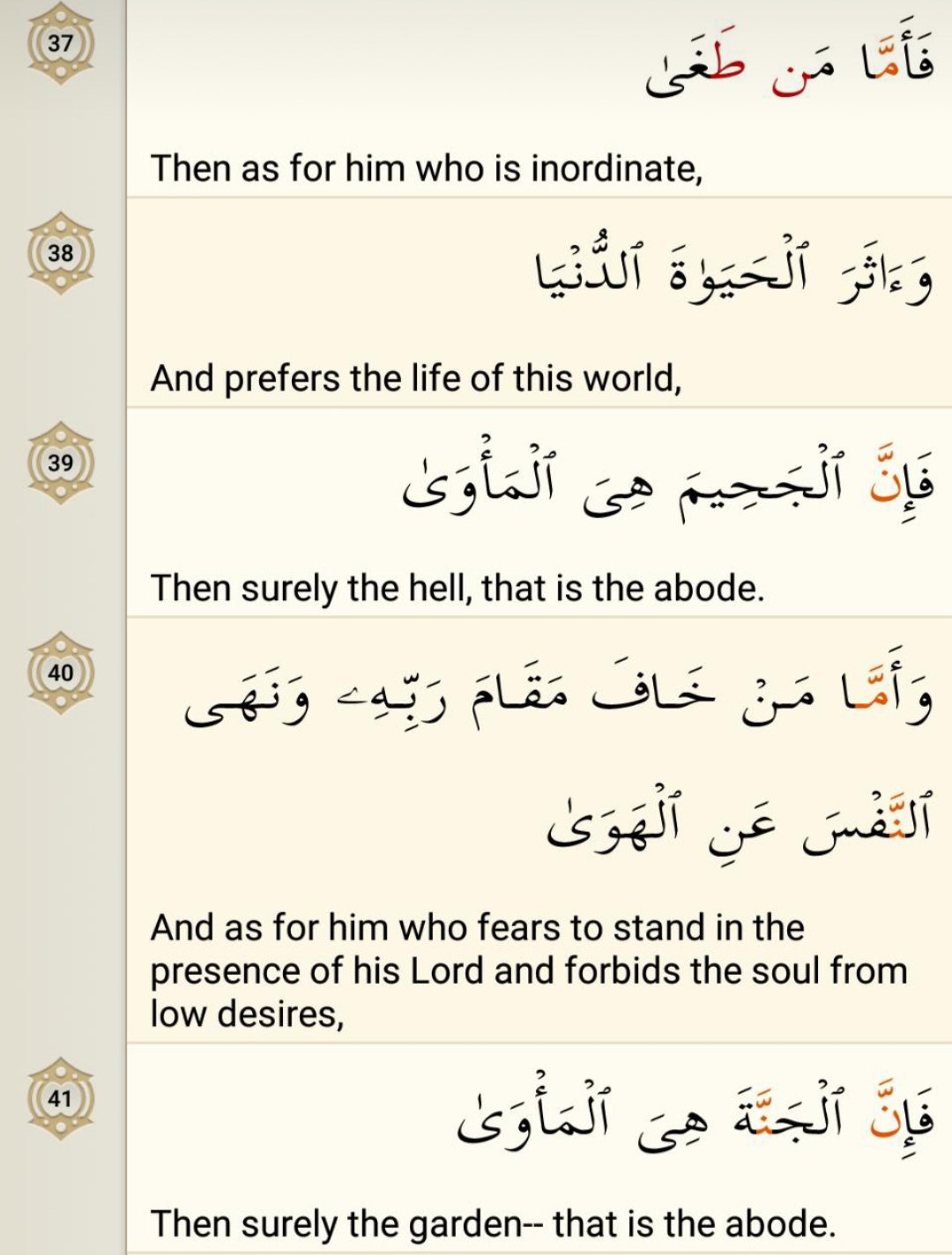
In these verses people are categorized in only two groups: the worldly rebels and the pious who fear Allah. The permanent abode of the first group is Hell, and the eternal site of the second group is Paradise.
People of Hell….
It has been told briefly what shall be the criterion of the final judgment in the Hereafter. One kind of the conduct of life in the world is that transgressing all bounds of service man should rebel against his Lord and should make up his mind that he would seek only the benefits and pleasures of this world in whatever way they could be sought and achieved.
The two main evils of such a mentality is transgression and preferring the worldly life & its desires. Aathara means to give preference. And so the source of rebellion is mentioned here. It’s the preference of worldly life and of following one’s desires. Ma’wa comes from iywa in Arabic which means to find some place to hide and seek refuge from danger. Allah is now saying that this jaheeem (HellFire) will be a place to find refuge. This is Allah’s sarcasm. The surah begins with the Quraish being sarcastic and now Allah is being sarcastic saying that this blazing fire will be their refuge.
People of Paradise…
The other kind of conduct is that while man passes life in the world he should constantly keep in view the truth that ultimately one day he has to stand before his Lord, and should refrain from fulfilling the evil desires of the self only for the fear that if he earned an unlawful benefit in obedience to his self, or enjoyed an evil pleasure, what answer he would give to his Lord.
Paradise will be the believer’s place of finding safety from danger. Bear in mind that this Surah is not about belief and disbelief in the Hereafter. This Surah is about preference of the Hereafter versus preference of this life which is one of the root causes of someone who disbelieves. This can also be a disease for the Muslim too who falls into dunia and forgets the Ahkirah, talking about it casually
The criterion of the judgment in the Hereafter will be which of the two kinds of conduct man adopted in the world. If he had adopted the first kind of conduct, his permanent abode would be Hell, and if he had adopted the second kind of conduct, his permanent home would be Paradise.
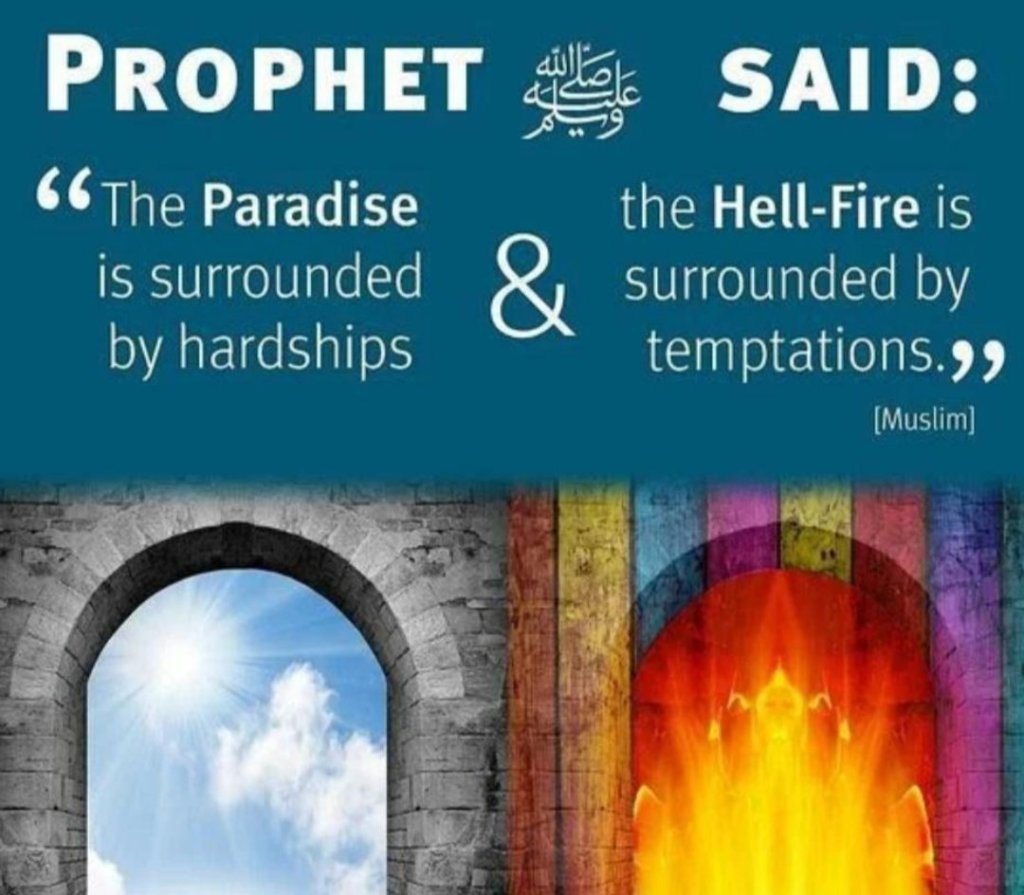
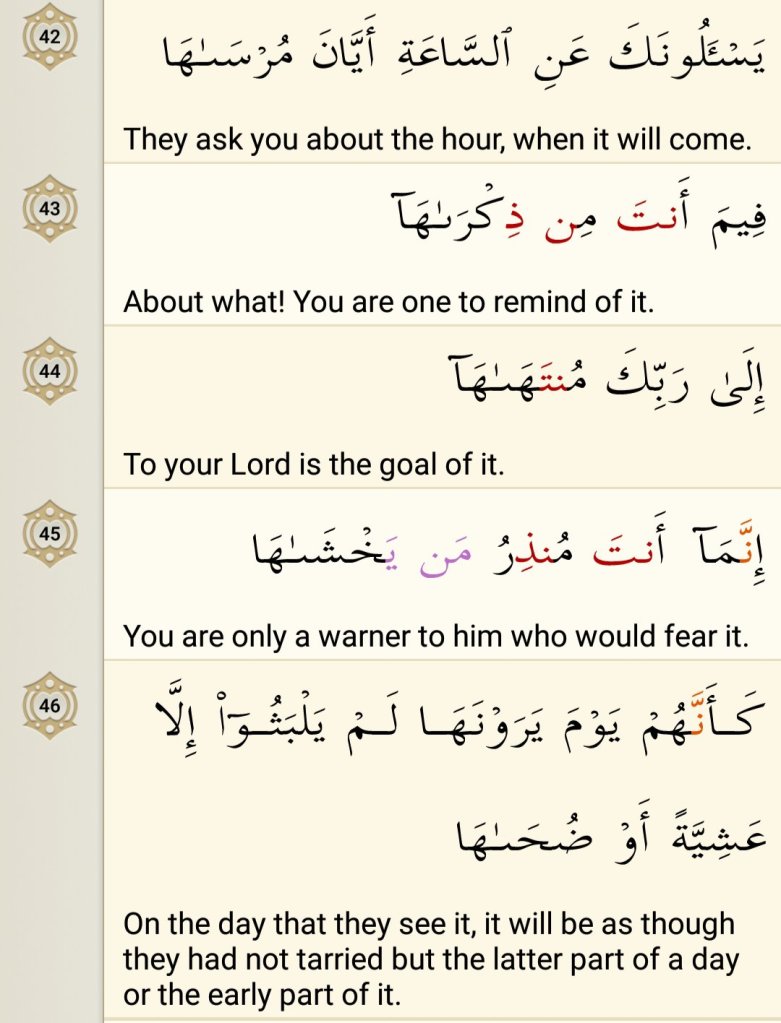
The disbelievers of Makkah asked this question of when will Resurrection be, to the Prophet pbuh over and over again. By this they did not mean to know the time and date of the coming of Resurrection but to mock it.
Allah says why should you be concerned with its exact timing? Allah asks the Prophet pbuh in what capacity are you to make mention of the hour. The Prophet pbuh does not have the capacity to mention when the Hour will come to pass but his job is only to mention that it is coming and get ready for it.
So after posing the question to the Prophet pbuh, Allah says only to your Lord will the final and complete knowledge of it be returned. Muntaha comes means the conclusion of something which also implies that the possession of the beginning of the events of Akhirah to the very end of the events of Akhirah belongs to Allah only.
Then Allah says to the Prophet pbuh that you are only a warner to him who fears it. This does not mean that it is not your duty to warn those who do not fear, but it means: “Your warning will benefit only him who fears the coming of that Day.”
When the disbelievers see the Day of Resurrection, it will seem to them that their life on earth had spanned only one morning or one afternoon. A’sheeya signifies the time when the sun starts setting i.e. from its peak at noon to Maghrib. Duha is the early morning i.e. from Fajr time to noon. Allah here is saying that their life will seem like one morning or afternoon in dunia in comparison to that hour. The length of the life, in this world, is so short and the period of the intermediate state (Barzakh) passes so quickly, that when they rise, again, for the Day of Judgment the whole period seems to them as if it were only a few hours.This idea, that the life in this world is short and fleeting, is both practical and true and, in comparison with the Hereafter and the life of the whole Universe, it is like a moment.
